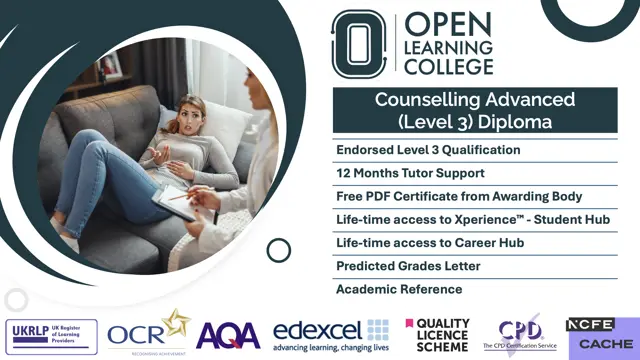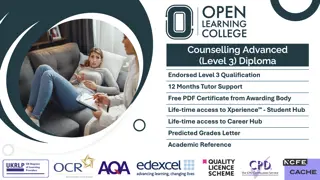
Counselling Advanced (Level 3) Diploma
Distance Learning Course, featuring tutor support and AI assistance, available online or as a study pack option.
Open Learning College
Summary
Funding options available on our website
- CPD & OPA - Free
- Exam(s) / assessment(s) is included in price
- Tutor is available to students
- TOTUM card included in price What's this?
Add to basket or enquire
Overview
Embark on a transformative learning journey with the UK’s most innovative home study provider, offering courses designed to unlock your true potential and facilitate the career change you desire. Access our distance learning courses directly from anywhere, anytime, and acquire industry-recognised Professional Qualifications essential for advancing in your career.
Specifically, explore the flexible and convenient Counselling Advanced (Level 3) course, an ideal way to gain a diploma qualification. Whether you aim for further education, improved job prospects, or expanded knowledge, this comprehensive course allows you to prepare thoroughly for exams or careers through home study. Plus, it’s structured to be accessible and beneficial even if you have no prior knowledge in Counselling Advanced.
This course is comprised of ten parts which are designed to give the student a good basic knowledge of the main theories underlying the most commonly practiced approaches to counselling and psychotherapy. It is a requirement for registration as a counsellor or psychotherapist that a candidate has obtained a certificate evidencing successful completion of a theoretical course providing a basic knowledge of the main theories in psychotherapy and counselling. Additionally the candidate will need to complete around 400-450 hours of supervised practical work, this is discussed in module 1 together with suggestions as to how such practical training maybe obtained.
The student will note that the terms counselling, psychotherapy and therapy are used interchangeably, as are the terms counsellor, psychotherapist and therapist, no apologies are made for this as these terms are used interchangeably in most of the literature on counselling and psychology. The term clinician is used in some texts on counselling and psychotherapy this term has overtones of medical qualification and has been deliberately avoided in this course. Any student who successfully completes this course is not medically qualified and if presented with a client who raises the slightest suspicion of requiring medical or psychiatric treatment, should advise such a client to consult their medical practitioner.
Much of the early work in counselling and psychotherapy was carried out in Europe and particularly Germany and Austria, as a result some German terminology is universally used, particularly in the early psychotherapeutic approaches. Where such words are used in this text, an English translation is offered, or where the word does not translate literally an attempt has been made to describe the concept referred to. Since many of the early psychologists and psychotherapist were Jewish, they were forced to flee Europe and Nazi persecution in the late 1930s, many of them making their homes in the USA. This lends a North American flavour and the incorporation of a good deal of American terminology to counselling and psychotherapy from the 1940s onwards.
The student will note a marked similarity in some of the techniques used in the different approaches, particularly those such as Existentialist, Rational Emotive and Adlerian therapies which are based on the assumption that human beings can control and change their destinies. For instance there are some strong similarities between Ellis’s Rational Emotive Therapy and Glasser’s Reality Therapy, yet there are also significant differences. The student should not treat the use of techniques as being universal, there are subtle differences between approaches and the student needs to be aware of these differences. Every module in the course requires the same attention, if the student is to appreciate the similarities and differences in the varying approaches.
Achievement
Certificates
CPD & OPA
Digital certificate - Included
Open Learning College have undergone external quality checks to ensure that the organisation and the courses’ it offers meet a high standard. Regular reviews of our courses are carried out as part of the endorsement process.
The course depth and study has been benchmarked at Level 3 against level descriptors published by Ofqual.
Visit www.cpduk.co.uk for more information.
1. You will receive your accreditation directly from CPD (CPD.dip), once you have successfully completed your course (certification fees are included in the course fee).
2. You will receive the Open Pathway Accreditation Diploma (OPA.dip) from Open Learning College.
Course media
Resources
- Counselling Advanced Level 3 (CPD) Course -
Description
Course Key Topics
The Counselling Advanced (Level 3) course is divided into 10 modules.
Module 1: Definition, Administrative Considerations and the Law
Module 2: Freud and Jung – the Psychoanalytic Approach
Module 3: Individual Psychology and Existentialism
Module 4: Gestalt Therapy and Psychodrama
Module 5: Client Centred Counselling
Module 6: Egan and the Skilled Helper Approach
Module 7: Transactional Analysis and Neuro-linguistic Programming
Module 8: The Rational Emotive Behavioural Approach and Cognitive Behavioural Therapy
Module 9: Reality Therapy and Post Traumatic Stress Counselling
Module 10: Communication Skills in Counselling
What Will You Learn?
- The Counselling Advanced Level 3 delves into an expansive array of advanced counselling techniques and theoretical frameworks.
- Learners explore deeper into client-centered approaches, psychodynamic and psychoanalytical theories, behavioral and cognitive therapies, and more.
- This level emphasizes refining counseling skills, understanding complex client needs, and applying various therapeutic interventions effectively.
- Modules encompass in-depth explorations of ethical considerations, neuro-linguistic programming, and diverse counselling models, enhancing learners' ability to handle intricate counselling scenarios with sensitivity and expertise.
Who is this course for?
- The Counselling Advanced Level 3 caters to a diverse audience, encompassing both seasoned professionals and individuals seeking to embark on a counseling career.
- It's tailored for practicing counselors looking to deepen their understanding of advanced counseling methodologies, theoretical frameworks, and interventions. Additionally, this course is an ideal fit for individuals aspiring to enter the counseling profession, providing a robust foundation for a successful career in counseling and psychotherapy.
- It appeals to those engaged in mental health, social care, or psychology fields, fostering their expertise in supporting individuals' emotional well-being and personal development.
Requirements
- The good news is that no prior learning knowledge or experience is essential to take this course. This course is openly available to anyone wishing to learn more about Counselling Advanced (Level 3) and would like to take part in a highly rewarding distance learning study course.
- We believe that everyone should have the opportunity to expand their knowledge and study further, so we try to keep our entry requirements to a minimum.
- You have the freedom to start the course at any time and continue your studies at your own pace for a period of up to 12 months from initial registration with full tutor support.
Career path
As a counsellor, you’ll actively listen to clients, offering them time, empathy and respect to talk about issues and problems, with the aim of reducing confusion and increasing their ability to cope with challenges, or to make positive changes to their lives.
Questions and answers
Reviews
Currently there are no reviews for this course. Be the first to leave a review.
Legal information
This course is advertised on reed.co.uk by the Course Provider, whose terms and conditions apply. Purchases are made directly from the Course Provider, and as such, content and materials are supplied by the Course Provider directly. Reed is acting as agent and not reseller in relation to this course. Reed's only responsibility is to facilitate your payment for the course. It is your responsibility to review and agree to the Course Provider's terms and conditions and satisfy yourself as to the suitability of the course you intend to purchase. Reed will not have any responsibility for the content of the course and/or associated materials.


